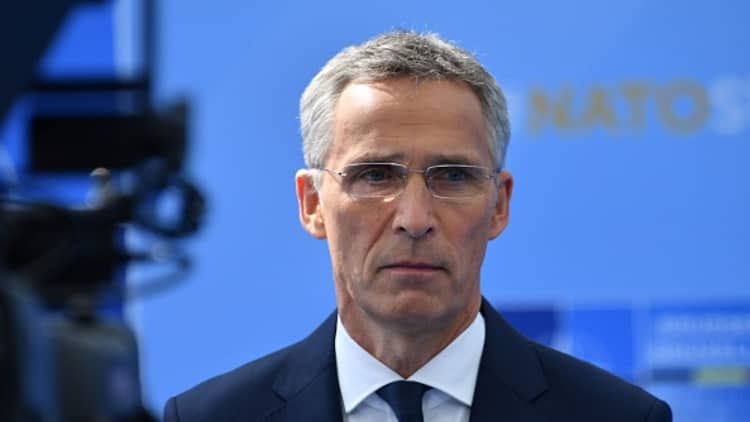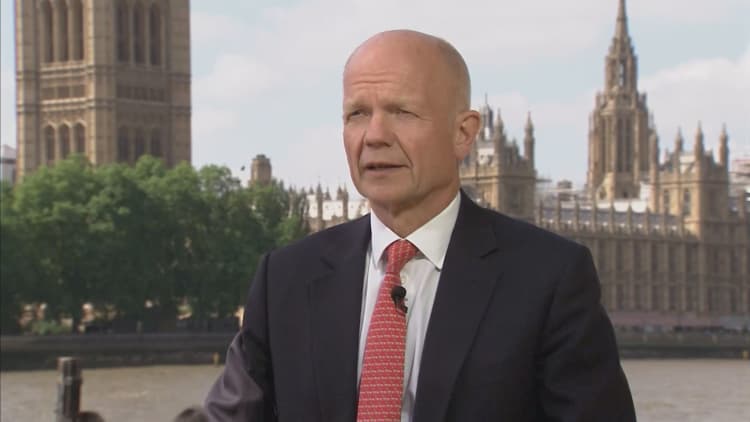President Donald Trump has put defense spending levels among NATO-member countries front and center this week in Brussels, where he has repeatedly berated America's NATO allies for not meeting an agreed-upon goal for each country to spend 2 percent of its annual gross domestic product on defense.
And while Trump is the first president to let defense spending levels dominate his approach to NATO, Trump is not the first president to pressure NATO countries to increase the amount they spend on their national defense.
Both former presidents George W. Bush and Barack Obama regularly expressed frustration with NATO member governments for not spending more of their domestic budgets on defense.
In 2006, then-president Bush used a NATO summit in Latvia to pressure allies to increase their defense spending at the height of the U.S.-led NATO military campaign in Afghanistan.
Two years later, he used his final NATO summit to do the same thing. "At this summit, I will encourage our European partners to increase their defense investments to support both NATO and EU operations," Bush said at the opening of the 2008 summit in Bucharest, Romania. "America believes if Europeans invest in their own defense, they will also be stronger and more capable when we deploy together," he said.
And despite the many differences between Bush's foreign policy and that of Obama, his successor, one thing the two leaders agreed upon was the need for more defense spending from NATO allies.
For Obama, the issue of NATO defense spending became especially important during his second term, when Russia's arming of separatists in Ukraine and subsequent annexation of Crimea in 2014 stunned the West.
"If we’ve got collective defense, it means that everybody’s got to chip in, and I have had some concerns about a diminished level of defense spending among some of our partners in NATO. Not all, but many," Obama said at a press conference in Brussels in March 2014, less than a week after Russia declared that Crimea was now a Russian state.

"The situation in Ukraine reminds us that our freedom isn’t free, and we’ve got to be willing to pay for the assets, the personnel, the training that’s required to make sure that we have a credible NATO force and an effective deterrent force," Obama said. "So one of the things that I think, medium and long term, we’ll have to examine, is whether everybody is chipping in."
Two years after that, in late 2016, with Crimea firmly under Russian control and Trump now the president-elect, Obama again raised the issue of defense spending levels among NATO countries. This time, the president used the example of Greece's success in meeting the 2 percent spending target as an opportunity to take a subtle dig at those countries that still failed to do so.
"I want to take this opportunity to commend Greece for being one of the five NATO allies that spends 2 percent of GDP on defense, a goal that we have consistently set but not everybody has met,” Obama said at a press conference in Athens in mid-November. “Greece has done this even during difficult economic times. If Greece can meet this NATO commitment, all our NATO allies should be able to do so,” Obama said.
Additional examples abound of both Bush and Obama talking about NATO spending.
What makes Trump's comments in Brussels this week so different, however, is how central the issue of defense spending is to Trump's assessment of NATO's value, or lack thereof, to the United States.
It's an evaluation made all the more complicated by Trump's apparent failure to fully grasp how defense spending targets work in a treaty alliance such as NATO.
On Wednesday, Trump repeatedly spoke about defense spending as if NATO countries owed the United States the money they had not decided to spend on their own domestic defense budgets, and as if the 2 percent of GDP that is the target for each country all goes into one pot and the U.S. has been paying other countries' share of the pot.
"Frankly, many countries owe us a tremendous amount of money for many years back, where they're delinquent, as far as I'm concerned, because the United States has had to pay for them," Trump said on Wednesday morning. "So if you go back 10 or 20 years, you'll just add it all up. It's massive amounts of money is owed," he said.
In reality, none of this money is "owed" to any other country. These are domestic spending levels, or money that NATO countries decide to spend on their own individual militaries. Not money they pay to anyone else.
Still, Trump got at least one thing right. "This has gone on for many presidents," he said. "But no other president brought it up like I bring it up."
WATCH: European security in the US' best interests



